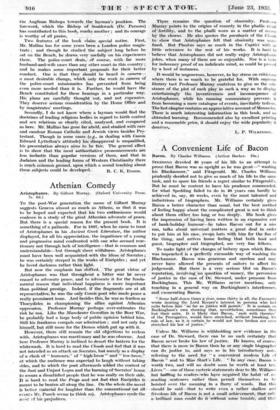Athenian Comedy
To the post-War generation the name of Gilbert Murray suggests Geneva almost as much as Athens; so that it was to be hoped and expected that his two enthusiasms would coalesce in a study of the great Athenian advocate of peace. But. there is a special reason for the present book. It is something of a palinode. For in 1897; when he came to treat of Aristophanes in his Ancient Greek Literature, the author displayed, for all his appreciation, the impatience- of a young and progressive mind confronted with one who seemed reac- tionary not through lack of intelligence—that is -common and understandable—but through sheer wilfulness. Aristophanes must have been well acquainted-with the ideas. of Socrates ; he was certainly steeped in the works of Euripides ; and yet
he IOVed darkness rather than light. -
But now the emphasis has shifted. The great virtue of Aristophanes was that throughont a bitter war he never ceased to Advocate peace, and to advocate it for the funda- mental reason that individual happiness is more important than political prestige. Indeed, if the fragments are at all representative, he was the only Comic poet who made peace a really prominent issue. And besides this, he was as fearless as Thucydides in championing the allies against Athenian oppression. Professor Murray perhaps over-estimates the risk he ran. Like the Manchester Guardian in the Boer War, he probably had a large body of public opinion behind him. Still his frankness compels our admiration ; and not only for hiniself, but still more for the Demos which put up with it. However, there still remain the old -objections to reckon with Aristophanes was reactionary and he was-obscene. And ..here Professor Murray is inclined to desert the lantern for the Whiteviash. It is hard to read the Clouds and feel that it was not intended as an attack. on Socrates, but namely as a display of 'a clashof " humours," of " high-brow" and "-low-brow," at which the audience was expected to laugh without taking sides, and to which the poet afterwards added the contest of the Just and Unjust Logos and the burning of Socrates' house to assure a dissatisfied people that he was really on their side. It is hard- to read the Frogs-and-not -feel -that Euripides is meant to be beaten all along the line. On the whole .the novel is better material for _laughter than the conventional (at all events Mr, Punch seems to think so). Aristophanes made the most of his prejudices: - There remains the question of obscenity. Professor Murray points to the origins of comedy in the phallic ritual of -fertility, and to the phalli worn as a matter of course by the chorus. He also quotes the parabasis of the Clouds ta: show that Aristophanes felt that obscenity was unre- fined. But Plautus says as much in the Captivi with as little relevance to the rest of his works. It is hard to ' believe that Aristophanes did not really enjoy Aristophanie jokes, when many of them are so enjoyable. Nor is a taste for indecency proof of an indelicate mind, as could be proved by a- host of instances.
It would be ungenerous, however, to lay stress on criticisms where there is so much to be grateful for. With supreme literary tact Professor Murray contrives to give us the sub- stance of the plot of each play in such a way as to display entertainingly the inventiveness and inconsequence of Aristophanes; while his running commentary prevents it from becoming a mere catalogue of events, inevitably tedious. The last chapter contains an appreciative account of Menander. There is much interesting information in this book, and no obtruded learning. Recommended also by- excellent printing and a reasonable price, it should enjoy the wide popularity it deserves.
L. P. WILKINSON.








































 Previous page
Previous page